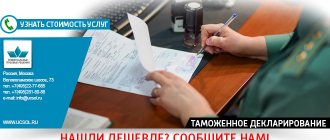What mitigates responsibility?
A judge, body, or official considering a case when imposing a fine for violation of non-declaration or false declaration of goods may recognize the following circumstances as mitigating | Art. 4.2 Code of Administrative Offenses of the Russian Federation:
- repentance of the person who committed the administrative offense;
- voluntary cessation of unlawful behavior;
- voluntary reporting of an administrative offense committed;
- providing assistance to the body authorized to carry out proceedings in a case of an administrative offense in establishing the circumstances to be established in a case of an administrative offense;
- preventing harmful consequences of an administrative offense;
- voluntary compensation for damage caused or voluntary elimination of harm caused;
- voluntary execution, before a decision is made in a case of an administrative offense, of an order to eliminate the violation;
- committing an administrative offense in a state of strong emotional excitement (affect) or due to a combination of difficult personal or family circumstances;
- commission of an administrative offense by a minor;
- commission of an administrative offense by a pregnant woman or a woman with a young child;
- A judge, body, or official considering a case of an administrative offense may recognize other circumstances as mitigating.
Exclusion of liability for violation of advertising laws
Insanity
You can almost always return an item!
The main thing is to know the procedure and use the law correctly. Get information for free from lawyers via chat (bottom right ↘️)
An individual who was in a state of insanity at the time of the commission of the offense is not subject to administrative liability | Art. 2.8 Code of Administrative Offenses of the Russian Federation:
- that is, he could not realize the actual nature and illegality of his actions (inaction) or direct them;
- due to a chronic mental disorder, temporary mental disorder, dementia or other morbid mental condition.
Urgent necessity
The assistance of a professional lawyer significantly increases the likelihood of a positive outcome of the case.
It is not an administrative offense for a person to cause harm to legally protected interests | Art. 2.8 Code of Administrative Offenses of the Russian Federation:
- to eliminate a danger that directly threatens the personality and rights of a given person or other persons, as well as the legally protected interests of society or the state, if this danger could not be eliminated by other means and if the harm caused is less significant than the harm prevented.
Insignificance
Also, a person may be released from administrative liability and limit himself to an oral remark if the act is insignificant | Art. 2.9 Code of Administrative Offenses of the Russian Federation. The following have the right to release:
- judge;
- organ;
- official authorized to resolve a case of an administrative offense.
what is insignificance
The insignificance of the offense occurs in the absence of a significant threat to protected social relations | Art. 2.9 Code of Administrative Offenses of the Russian Federation. A minor administrative offense is an action or inaction, although formally containing the elements of an administrative offense, but taking into account the nature of the offense committed and the role of the offender, the amount of harm and the severity of the consequences, which does not represent a significant violation of protected public legal relations. It must be borne in mind that, taking into account the signs of the objective side of some administrative offenses, under no circumstances can they be considered insignificant, since they significantly violate protected social relations. These include, in particular, the following administrative offenses:
- driving a vehicle while intoxicated | Art. 12.8 Code of Administrative Offenses of the Russian Federation;
- refusal to undergo a medical examination | Art. 12.26 Code of Administrative Offenses of the Russian Federation.
The following circumstances do not matter:
- personality;
- property status;
- voluntary elimination of consequences;
- compensation for damage caused.
What aggravates responsibility
A judge, body, or official imposing an administrative penalty, depending on the nature of the administrative offense committed, may recognize the following circumstances as aggravating | Art. 4.3 Code of Administrative Offenses of the Russian Federation:
- continuation of illegal behavior despite the demand of authorized persons to stop it;
- repeated commission of a similar administrative offense;
- involvement of a minor in committing an administrative offense;
- commission of an administrative offense by a group of persons;
- committing an administrative offense during a natural disaster or other emergency circumstances;
- committing an administrative offense while intoxicated or refusing to undergo a medical examination for intoxication if there are sufficient grounds to believe that the person who committed the administrative offense is in a state of intoxication.
Import and export of cash
Everyone understands that it is impossible to import and export an indefinite amount of money. You can’t just take out $50,000 and bring it in as well. There are certain rules for import and export, and to make it clearer to you and there are consequences for failure to declare cash, I will tell you about this in detail, also Article 16.7 of the Code of Administrative Offenses of the Russian Federation, the presentation of invalid documents when performing customs operations entails a fine and confiscation of goods, but if you have problems, resolving customs disputes is a rare phenomenon for an ordinary citizen, but if they arise, they can be solved with our help
Rules for exporting money outside the territory of the Russian Federation
One-time export of cash is possible from the customs territory of the Customs Union, but there are exceptions, namely:
- The amount of cash is equal to or does not exceed $10,000 equivalent.
- If the amount exceeds $10,000, then a written declaration is required for the entire amount of imported cash.
- Recalculation of funds is carried out in accordance with the legislation of the country through whose border the funds are transferred. The recalculation itself is carried out at the exchange rate on the day of the passenger declaration. If you violate the requirements, you will be liable for a fine for violating customs regulations.
Rules for exporting money
One-time export, as well as import, is carried out according to the same rules, but there are exceptions to declaration, namely:
- for a one-time export from the Russian Federation in the amount of over 3,000 US dollars in equivalent
- for a one-time import in the amount of over 10,000 US dollars in equivalent
But there are also times when we ask ourselves, can a child take out currency? There is an answer to this question, and it corresponds to the Labor Code of the Russian Federation. Persons aged 16 years crossing the border unaccompanied by adults have the right to export currency for minors of only $3,000, and this is due to the fact that a person under 16 years of age does not have the right to declare goods being transported in an amount exceeding $3,000.








